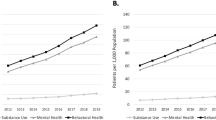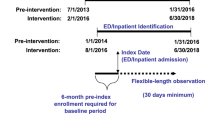Abstract
Medicaid is an important funder of care for individuals with behavioral (psychiatric and/or substance use) diagnoses, and expenditures will likely increase with expansion of services under the Affordable Care Act. This study provides national estimates of Medicaid expenditures using a comprehensive sample of fee-for-service Medicaid enrollees with behavioral diagnoses. Data for analysis came from 2003 to 2004 Medicaid Analytic eXtract (MAX) files for 50 states and the District of Columbia. Individuals with behavioral diagnoses had high rates of chronic medical comorbidities, and expenditures for medical (non-behavioral) diagnoses accounted for 74 % of their health care expenditures. Total Medicaid expenditure was approximately 15 billion dollars (equivalent to 18.91 billion in 2016 dollars) for individuals with any behavioral diagnosis. Medicaid fee-for-service beneficiaries with behavioral diagnoses have a high treated prevalence of individual medical comorbid conditions, and the majority of health care expenditures in these individuals are for medical, rather than behavioral health, services.

Similar content being viewed by others
References
Buck, J. A. (2003). Medicaid, health care financing trends, and the future of state-based public mental health services. Psychiatric Services (Washington, D. C.), 54(7), 969–975.
Buck, J. A. (2011). The looming expansion and transformation of public substance abuse treatment under the affordable care act. Health Affairs (Project Hope), 30(8), 1402–1410. doi:10.1377/hlthaff.2011.0480.
Centers for medicare and medicaid services (2016). CMS finalizes mental health and substance use disorder parity rule for medicaid and CHIP. Retrieved June 2, 2016, from https://www.cms.gov/Newsroom/MediaReleaseDatabase/Press-releases/2016-Press-releases-items/2016-03-29.html.
Cournos, F., McKinnon, K., & Sullivan, G. (2005). Schizophrenia and comorbid human immunodeficiency virus or hepatitis C virus. Journal of Clinical Psychiatry, 66(Suppl 6), 27–33.
Cummings, J. R., Wen, H., Ko, M., & Druss, B. G. (2014). Race/ethnicity and geographic access to medicaid substance use disorder treatment facilities in the United States. JAMA Psychiatry, 71(2), 190–196. doi:10.1001/jamapsychiatry.2013.3575.
De Hert, M., Correll, C. U., Bobes, J., Cetkovich-Bakmas, M., Cohen, D., Asai, I., et al. (2011). Physical illness in patients with severe mental disorders. I. Prevalence, impact of medications and disparities in health care. World Psychiatry, 10(1), 52–77. doi:10.1002/j.2051-5545.2011.tb00014.x.
Decker, S. L., Kostova, D., Kenney, G. M., & Long, S. K. (2013). Health status, risk factors, and medical conditions among persons enrolled in medicaid vs uninsured low-income adults potentially eligible for medicaid under the affordable care act. JAMA: The Journal of the American Medical Association, 309(24), 2579–2586. doi:10.1001/jama.2013.7106.
Degenhardt, L., Whiteford, H. A., Ferrari, A. J., Baxter, A. J., Charlson, F. J., Hall, W. D., et al. (2013). Global burden of disease attributable to illicit drug use and dependence: Findings from the global burden of disease study 2010. Lancet, 382(9904), 1564–1574. doi:10.1016/s0140-6736(13)61530-5.
Dickey, B., Normand, S. L., Weiss, R. D., Drake, R. E., & Azeni, H. (2002). Medical morbidity, mental illness, and substance use disorders. Psychiatric Services (Washington, D. C.), 53(7), 861–867.
Freeman, E., McGuire, C. A., Thomas, J. W., & Thayer, D. A. (2014). Factors affecting costs in medicaid populations with behavioral health disorders. Medical Care, 52(Suppl 3), S60–66. doi:10.1097/mlr.0000000000000075.
Guo, J. J., Keck, P. E. Jr., Li, H., Jang, R., & Kelton, C. M. (2008). Treatment costs and health care utilization for patients with bipolar disorder in a large managed care population. Value In Health: The Journal of the International Society for Pharmacoeconomics and Outcomes Research, 11(3), 416–423. doi:10.1111/j.1524-4733.2007.00287.x.
Guo, J. J., Keck, P. E., Li, H., & Patel, N. C. (2007). Treatment costs related to bipolar disorder and comorbid conditions among medicaid patients with bipolar disorder. Psychiatric Services (Washington, D. C.), 58(8), 1073–1078. doi:10.1176/appi.ps.58.8.1073.
Health and behavior: The Interplay of biological, behavioral, and societal influences. (2001). Washington DC: National Academy of Sciences.
Hennessy, S., Bilker, W. B., Weber, A., & Strom, B. L. (2003). Descriptive analyses of the integrity of a US medicaid claims database. Pharmacoepidemiology and Drug Safety, 12(2), 103–111. doi:10.1002/pds.765.
Howard, P. B., El-Mallakh, P., Rayens, M. K., & Clark, J. J. (2007). Comorbid medical illnesses and perceived general health among adult recipients of medicaid mental health services. Issues in Mental Health Nursing, 28(3), 255–274. doi:10.1080/01612840601172593.
Jones, D. R., Macias, C., Barreira, P. J., Fisher, W. H., Hargreaves, W. A., & Harding, C. M. (2004). Prevalence, severity, and co-occurrence of chronic physical health problems of persons with serious mental illness. Psychiatric Services (Washington, D. C.), 55(11), 1250–1257. doi:10.1176/appi.ps.55.11.1250.
Kronick, R. G., Bella, M., & Gilmer, T. P. (2009). The faces of medicaid III: Refining the portrait of people with multiple chronic conditions. Trenton: Center for Health Care Strategies, Inc.
Lehnert, T., Heider, D., Leicht, H., Heinrich, S., Corrieri, S., Luppa, M., Konig, H. H., et al. (2011). Review: Health care utilization and costs of elderly persons with multiple chronic conditions. Medical Care Research and Review: MCRR, 68(4), 387–420. doi:10.1177/1077558711399580.
Quan, H., Sundararajan, V., Halfon, P., Fong, A., Burnand, B., Luthi, J. C., et al. (2005). Coding algorithms for defining comorbidities in ICD-9-CM and ICD-10 administrative data. Medical Care, 43(11), 1130–1139.
Razzano, L. A., Cook, J. A., Yost, C., Jonikas, J. A., Swarbrick, M. A., Carter, T. M., & Santos, A. (2015). Factors associated with co-occurring medical conditions among adults with serious mental disorders. Schizophrenia Research, 161(2–3), 458–464. doi:10.1016/j.schres.2014.11.021.
Rosenberg, S. D., Goodman, L. A., Osher, F. C., Swartz, M. S., Essock, S. M., Butterfield, M. I., et al. (2001). Prevalence of HIV, hepatitis B, and hepatitis C in people with severe mental illness. American Journal of Public Health, 91(1), 31–37.
Stein, B. D., Kogan, J. N., & Sorbero, M. (2009). Substance abuse detoxification and residential treatment among medicaid-enrolled adults: Rates and duration of subsequent treatment. Drug and Alcohol Dependence, 104(1–2), 100–106. doi:10.1016/j.drugalcdep.2009.04.008.
Thomas, M. R., Waxmonsky, J. A., Gabow, P. A., Flanders-McGinnis, G., Socherman, R., & Rost, K. (2005). Prevalence of psychiatric disorders and costs of care among adult enrollees in a medicaid HMO. Psychiatric Services (Washington, D. C.), 56(11), 1394–1401. doi:10.1176/appi.ps.56.11.1394.
US Department of health and human services, health resources and services administration, bureau of health workforce. (2005). Area Health resources files (AHRF). Rockville, MD: Quality Resource Systems, Inc.
US Department of Labor, Bureau of Labor Statistics. Retrieved June 2, 2016, from http://www.in2013dollars.com/.
Funding
Dr. Druss receives grant support from NIH Grant K24 MH075867.
Author information
Authors and Affiliations
Corresponding author
Rights and permissions
About this article
Cite this article
Ward, M.C., Lally, C. & Druss, B.G. Medicaid Expenditures for Fee-for-Service Enrollees with Behavioral Diagnoses: Findings from a 50 State Claims Analysis. Community Ment Health J 53, 1–7 (2017). https://doi.org/10.1007/s10597-016-0032-4
Received:
Accepted:
Published:
Issue Date:
DOI: https://doi.org/10.1007/s10597-016-0032-4




